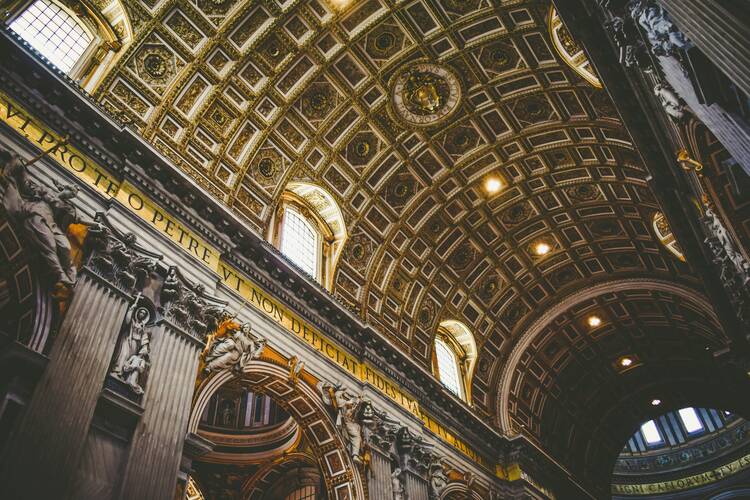A Reflection for Thursday of the Eighteenth Week in Ordinary Time
Find today’s readings here.
“You are Peter, and upon this rock I will build my Church, and the gates of the netherworld shall not prevail against it.”
Today’s Gospel introduces us to one of the core components of our faith: the institution of the church. Why be Catholic? Why participate in a religious life organized around a human institution that, divinely guided though it may be, can be afflicted by the sins of those who make it up? What is the institutional church for? When friends and family ask me why I have said “yes” not only to the Catholic faith but also to the Catholic church, I instinctively reach for elemental theology. I often cite the Council of Trent’s relatively forgiving view of human nature as contrasted with Calvin’s forbidding, fire-and-brimstone portrayal of inherent human brokenness. But today’s passage from Matthew addresses an aspect of the Gospels that I place at the heart of my faith: the love and trust that Jesus places in us by giving a human being the mission of building his church.
By making Peter the rock upon which the Catholic church is built, Jesus reminds us of an essential truth: On this side of eternity, our faith is–and must be–mediated through other human beings. It is essential for each of us to cultivate a personal relationship with Jesus, but our Christian life is incomplete if we do not enter into communion with others. This church is not an abstract entity, not merely a theological notion; it is a particular, embodied community made up of earthly people–people like you, me, or Peter. Why be Catholic? Why be part of the church? Because Jesus is there.
Do we have to be perfect in order to embody the church? Is the church itself perfect? Jesus’ rebuke to Peter tells us otherwise: “Get behind me, Satan! You are an obstacle to me. You are thinking not as God does, but as human beings do.” It’s one of the most confounding passages in Scripture at first pass, but what it teaches us about both our church and Jesus’ love for us is essential. What can be said about the church’s real shortcomings that was not already said by Jesus when he referred to his rock, his most trusted disciple, as “Satan?” When Jesus founded his church on this earth, he factored in our weaknesses, our failings and our sins. He knew that we would grievously err, that our human egos and ideologies would often get in the way of his love. Yet even as he rebukes Peter for acting according to the lesser impulses of his imperfect humanity, he maintains faith in him to serve as his rock–because, for all of Peter’s mistakes, he has sufficient faith in Jesus to be able to say “You are the Christ, the Son of the living God.”
Peter’s faith coexists with his mistakes but ultimately allows him to rise above them—and to serve as a model for all of us who wrestle with our own faults but strive to grow in faith and love. So, too, does the church itself, in its very human complexity, orient us towards the love of Jesus. We, human beings, are emissaries of God’s love and grace in this world; when we gather together in the universal (katholikos) church and encounter each other, we encounter the one who gave a human being just like us the keys to the Kingdom of Heaven.








